World will look back at 2023 as year humanity exposed its inability to tackle climate crisis – “This year and next will be seen as the turning point at which the futility of governments in dealing with climate change was finally exposed”

By Jonathan Watts
29 December 2023
(The Guardian) – The hottest year in recorded history casts doubts on humanity’s ability to deal with a climate crisis of its own making, senior scientists have said.
As historically high temperatures continued to be registered in many parts of the world in late December, the former NASA scientist James Hansen told the Guardian that 2023 would be remembered as the moment when failures became apparent.
“When our children and grandchildren look back at the history of human-made climate change, this year and next will be seen as the turning point at which the futility of governments in dealing with climate change was finally exposed,” he said.
“Not only did governments fail to stem global warming, the rate of global warming actually accelerated.”

After what was probably the hottest July in 120,000 years, Hansen, whose testimony to the US Senate in 1988 is widely seen as the first high-profile revelation of global heating, warned that the world was moving towards a “new climate frontier” with temperatures higher than at any point over the past million years.
Now director of the climate programme at Columbia University’s Earth Institute in New York, Hansen said the best hope was for a generational shift of leadership.
“The bright side of this clear dichotomy is that young people may realise that they must take charge of their future. The turbulent status of today’s politics may provide opportunity,” he said.
His comments are a reflection of the dismay among experts at the enormous gulf between scientific warnings and political action. It has taken almost 30 years for world leaders to acknowledge that fossil fuels are to blame for the climate crisis, yet this year’s United Nations Cop28 summit in Dubai ended with a limp and vague call for a “transition away” from them, even as evidence grows that the world is already heating to dangerous levels.

Scientists are still processing data from this blistering year. The latest to state it will be a record was the Japanese meteorological agency, which measured temperatures in 2023 at 0.53°C above the global average between 1991 and 2020.
This was far above the previous record set in 2016, when temperatures were 0.35°C above that average. Over the longer term, the world is about 1.2C hotter than in preindustrial times.
The US National Oceanic and Atmospheric Administration previously calculated that there was a “greater than 99% chance” that 2023 would be the hottest year in its 174-year dataset. This followed six record warm months in a row, including the northern hemisphere’s warmest summer and autumn.
Driven by human-caused global heating and El Niño, the heat refused to relent. In November, there was an even greater anomaly, with two days warmer than 2°C above the preindustrial average, according to Europe’s Copernicus Climate Change Service.
It too has already confirmed the annual record, as has the World Meteorological Organization. In December, many parts of the world sweltered through the hottest-ever Christmas. With the new year approaching, monthly temperature records were still being beaten in central Asia, South America, Europe, and Australia.

Berkeley Earth has predicted that average temperatures in 2023 will almost certainly prove to have been 1.5°C higher than preindustrial levels. Although climate trends are based on decadal rather than annual measurements, many scientists say it is probably only a matter of time before the world overshoots the most ambitious of the Paris agreement targets.
Veteran climate watchers have been horrified at the pace of change. “The climate year 2023 is nothing but shocking, in terms of the strength of climate occurrences, from heatwaves, droughts, floods and fires, to rate of ice melt and temperature anomalies particularly in the ocean,” Prof Johan Rockström, the joint director of the Potsdam Institute for Climate Impact Research in Germany, said.
He said these new developments indicated the Earth was in uncharted territory and under siege. “What we mean by this is that we may be seeing a shift in Earth’s response to 250 years of escalated human pressures … to a situation of ‘payback’ where Earth starts sending invoices back to the thin layer on Earth where humans live, in the form of off the charts extremes.”
Rockstrom was among the authors of the 2018 “Hothouse Earth” paper, which warned of a domino-like cascade of melting ice, warming seas and dying forests could tilt the planet into a state beyond which human efforts to reduce emissions will be increasingly futile.
Five years on, he said that what disturbed him most in 2023 was the sharp increase in sea surface temperatures, which have been abrupt even for an El Niño year.
“We do not understand why the ocean heat increase is so dramatic, and we do not know what the consequences are in the future,” he said. “Are we seeing the first signs of a state shift? Or is it [a] freak outlier?” [more]


